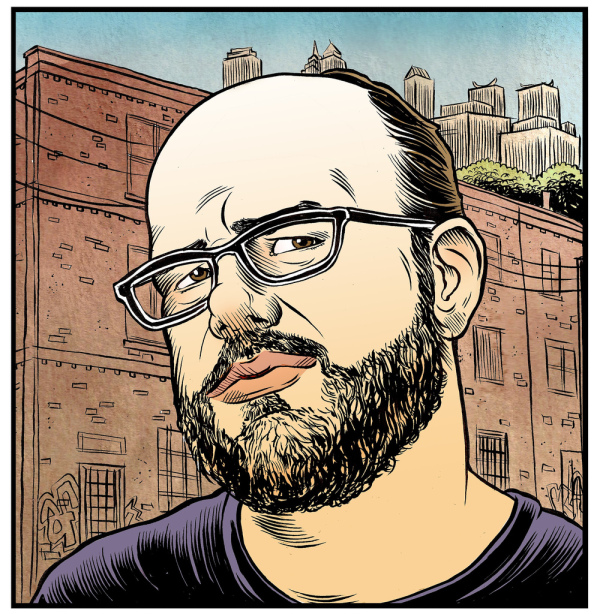Illustration by ALEX FINE
JEFF DEENEY FOR THE MARSHALL PROJECT: As a social worker, I’ve always been conflicted about the fact that I work in a law enforcement setting. My desk is situated among probation officers (POs), typically in baby blue polo style shirts with “PROBATION” written across the back. Officers from the court system’s warrant squad come and go, dressed in black commando gear, pants tucked into their boots so they don’t trip when they run (they’re basically always running after people.) I see guns in the office, all the time. It’s a controlled environment; people are searched on their way in, communicate with administrative staff through Plexiglas before getting buzzed into a tiny locked room where they’re separated from their POs by a desktop barrier. Under the desk is a panic button a PO can hit if he  needs to call the warrant squad to come grip a dude up and take him into custody. There’s an ad hoc lab on the floor I work on, where every day gallons of urine are collected and sent out for drug testing.
needs to call the warrant squad to come grip a dude up and take him into custody. There’s an ad hoc lab on the floor I work on, where every day gallons of urine are collected and sent out for drug testing.
It’s not only not a place conducive to therapeutic interaction, it’s a gloomy, misery-inducing dump absolutely nobody enjoys coming to, POs or probationers. The building is old, falling apart, filled with bugs and mice. The equipment POs work on is almost comically outdated (POs got new computers recently – bringing them up to date from 2004, when the last batch of office PCs had been bought). Just riding the failing elevators is a dice roll, because they frequently stick between floors, or the doors won’t open.
There’s a plan for the office to eventually move into a new, upgraded space, but not because anyone feels the department deserves better digs. In recent years our corner has undergone significant redevelopment, with a rework of the convention center across the street and a luxury hotel with a French name moving into the building next door. One gets the sense that the relocation is less about improving the probation venue than relocating the long line of often heavily tattooed black men that stretches down the block every morning, so tourists won’t have to walk by them on the way to breakfast.
The physical condition of the probation office is critical to understanding what thousands of drug users and sellers experience once they’ve entered the criminal justice system.  It’s a space that amplifies hostility. Probationers continually complain about what they feel are probation officers who are abusive, disrespectful, racist or petty power trippers out to wreck your life just to show you they can. Conversely, POs feel underpaid, underappreciated and under constant assault by criminals who would just as soon stab them in the back if they thought they could get away with it. So POs are frequently rigid and stand-offish as they seek to impose control, and probationers are often the same as they seek to resist it. Authority and the anti-authoritarian become locked in a bitter embrace that, based on what I’ve seen over the years, is mutually destructive. MORE
It’s a space that amplifies hostility. Probationers continually complain about what they feel are probation officers who are abusive, disrespectful, racist or petty power trippers out to wreck your life just to show you they can. Conversely, POs feel underpaid, underappreciated and under constant assault by criminals who would just as soon stab them in the back if they thought they could get away with it. So POs are frequently rigid and stand-offish as they seek to impose control, and probationers are often the same as they seek to resist it. Authority and the anti-authoritarian become locked in a bitter embrace that, based on what I’ve seen over the years, is mutually destructive. MORE
RELATED: The Marshall Project is a nonprofit, nonpartisan news organization founded on two simple ideas:
1) There is a pressing national need for high-quality journalism about the American criminal justice system. The U.S. incarcerates more people than any country in the world. Spiraling costs, inhumane prison conditions, controversial drug laws, and concerns about systemic racial bias have contributed to a growing bipartisan consensus that our criminal justice system is in desperate need of reform.
The recent disruption in traditional media means that fewer institutions have the resources to take on complex issues such as criminal justice. The Marshall Project stands out against this landscape by investing in journalism on all aspects of our justice system. Our work will be shaped by accuracy, fairness, independence, and impartiality, with an emphasis on stories that have been underreported or misunderstood. We will partner with a broad array of media organizations to magnify our message, and our innovative website will serve as a dynamic hub for the most significant news and comment from the world of criminal justice.
2) With the growing awareness of the system’s failings, now is an opportune moment to amplify the national conversation about criminal justice. We believe that storytelling can be a powerful agent of social change. Our mission is to raise public awareness around issues of criminal justice and the possibility for reform. But while we are nonpartisan, we are not neutral. Our hope is that by bringing transparency to the systemic problems that plague our courts and prisons, we can help stimulate a national conversation about how best to reform our system of crime and punishment. MORE

